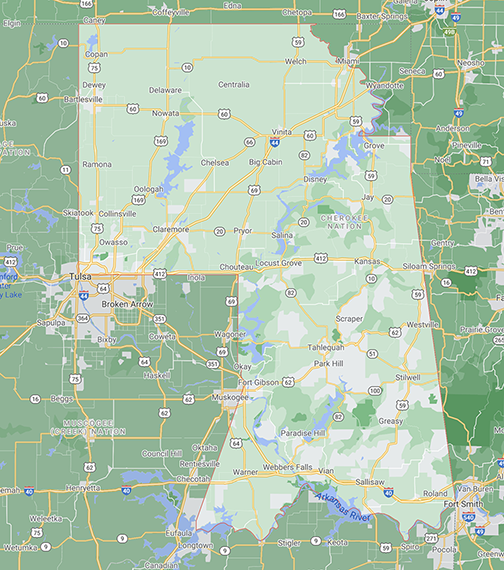
- Details
- By Native News Online Staff
TAHLEQUAH, Okla. — Google Maps took notice of the McGirt v. Oklahoma decision on July 9, in which the U.S. Supreme Court ruled that Congress never “disestablished” the 1866 boundaries of the Muscogee (Creek) Nation, whose territory encompasses three million acres and includes most of the city of Tulsa.
"Google Maps aims to provide the freshest, most accurate map possible. In response to July's Supreme Court decision, we worked to evaluate authoritative data and then used this information to add labels and borders for the Muscogee (Creek) Nation, Cherokee, Chickasaw, Choctaw, and Seminole reservations to Google Maps. These reservations are now viewable and searchable on Google Maps," Raleigh Seamster, program manager for Google Maps said.
Google Maps’ efforts are appreciated by the Cherokee Nation.
“After the monumental US Supreme Court ruling in McGirt v Oklahoma, we’ve had many questions about our reservation boundaries, which always existed on paper maps. Now that our reservation is labeled on Google Maps, it’s easy for people around the world to search and see our reservation boundaries,” Cherokee Nation Principal Chief Chuck Hoskin Jr. said.
The Cherokee Nation reservation boundaries include 7,000 miles in northeastern Oklahoma.
Cherokee Nation citizen Joseph Erb provided feedback about the reservation mapping project, which includes mapping for all Five Civilized Tribes.
“It is an exciting step forward to be included on the map,” Erb said. “This is a visual reminder that our nation is still here and a contemporary Indigenous nation of the continent.”
CLICK to view the Cherokee Nation reservation on Google Maps.
More Stories Like This
Native News Weekly (August 25, 2024): D.C. BriefsUS Presidents in Their Own Words Concerning American Indians
Native News Weekly (December 14, 2025): D.C. Briefs
Wounded Knee Massacre Site Protection Bill Passes Congress
Two Murdered on Colville Indian Reservation
Help us defend tribal sovereignty.
At Native News Online, our mission is rooted in telling the stories that strengthen sovereignty and uplift Indigenous voices — not just at year’s end, but every single day.
Because of your generosity last year, we were able to keep our reporters on the ground in tribal communities, at national gatherings and in the halls of Congress — covering the issues that matter most to Indian Country: sovereignty, culture, education, health and economic opportunity.
That support sustained us through a tough year in 2025. Now, as we look to the year ahead, we need your help right now to ensure warrior journalism remains strong — reporting that defends tribal sovereignty, amplifies Native truth, and holds power accountable.
 The stakes couldn't be higher. Your support keeps Native voices heard, Native stories told and Native sovereignty defended.
The stakes couldn't be higher. Your support keeps Native voices heard, Native stories told and Native sovereignty defended.
Stand with Warrior Journalism today.
Levi Rickert (Potawatomi), Editor & Publisher

